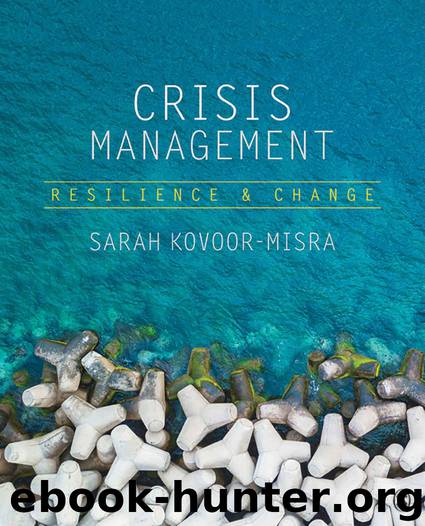Crisis Management by Kovoor-Misra Sarah

Author:Kovoor-Misra, Sarah
Language: eng
Format: epub
Publisher: SAGE Publications
Published: 2019-01-30T16:00:00+00:00
Transformative Organizational Culture
For an organizational culture to foster resilience and positive behaviors during a crisis, its components, such as beliefs, values, norms and artifacts, need to reinforce these behaviors. Table 6.4 provides some examples of transformative cultural components, and they are discussed subsequently.
First, leaders need to specify the desired beliefs in their vision. At the core of the organizational culture are the assumptions or the taken-for-granted beliefs that drive behavior within the organization. These beliefs are important because during the threat, stress, and ambiguity of a crisis, they can guide and shape behaviors. Table 6.4 provides some examples of transformative beliefs, such as “It is possible to be both excellent, politically savvy, focused on the profit-motive and at the same time to also behave with integrity during crisis management” and “Positive relationships with diverse stakeholders are important for successful crisis management.”
Second, leaders need to specify their desired values and highlight what is important. Table 6.4 identifies some important values for TCM. To capture these values, the acronyms of RICH and RISEN are used as important metaphors. They illustrate how a value for trustworthy relationships with diverse stakeholders, integrity, courage, and hope (RICH) together create a rich and fertile environment within the organizational system where all parties can thrive. In addition, a value for resilience, innovation, social responsibility, excellence, and nonstop learning (RISEN) enables organizations to rise, excel, be competitive, overcome challenges, and make positive contributions in their environments. These values emphasize competence in tasks (e.g., resilience, excellence, innovation, nonstop learning, and hope), social aspects (trustworthy relationships and social responsibility), and moral behavior (e.g., integrity and courage).
Table 6.4 Examples of Transformative Organizational Culture Components
Table 6.4 Examples of Transformative Organizational Culture Components Beliefs
It is possible to be excellent, politically savvy, and focused on the profit-motive, and to behave with integrity during crisis management.
Positive relationships with diverse stakeholders and social responsibility are important for successful crisis management.
Excellence and trust are critical for successful crisis management.
It is important to balance the need for swift recovery with healing, learning, and growth postcrisis.
It is important to continually learn and grow from negative events.
Download
This site does not store any files on its server. We only index and link to content provided by other sites. Please contact the content providers to delete copyright contents if any and email us, we'll remove relevant links or contents immediately.
Bad Blood by John Carreyrou(6608)
Rich Dad Poor Dad by Robert T. Kiyosaki(6596)
Principles: Life and Work by Ray Dalio(6403)
Playing to Win_ How Strategy Really Works by A.G. Lafley & Roger L. Martin(6207)
Management Strategies for the Cloud Revolution: How Cloud Computing Is Transforming Business and Why You Can't Afford to Be Left Behind by Charles Babcock(4562)
The Confidence Code by Katty Kay(4245)
Thinking in Bets by Annie Duke(4213)
American Kingpin by Nick Bilton(3869)
Delivering Happiness by Tony Hsieh(3415)
Project Animal Farm: An Accidental Journey into the Secret World of Farming and the Truth About Our Food by Sonia Faruqi(3211)
The Power of Habit by Charles Duhigg(3121)
The Tyranny of Metrics by Jerry Z. Muller(3056)
Brotopia by Emily Chang(3047)
The Marketing Plan Handbook: Develop Big-Picture Marketing Plans for Pennies on the Dollar by Robert W. Bly(3041)
Mastering Bitcoin: Programming the Open Blockchain by Andreas M. Antonopoulos(3033)
I Live in the Future & Here's How It Works by Nick Bilton(2984)
The Content Trap by Bharat Anand(2913)
Building a StoryBrand by Donald Miller(2889)
Applied Empathy by Michael Ventura(2888)
